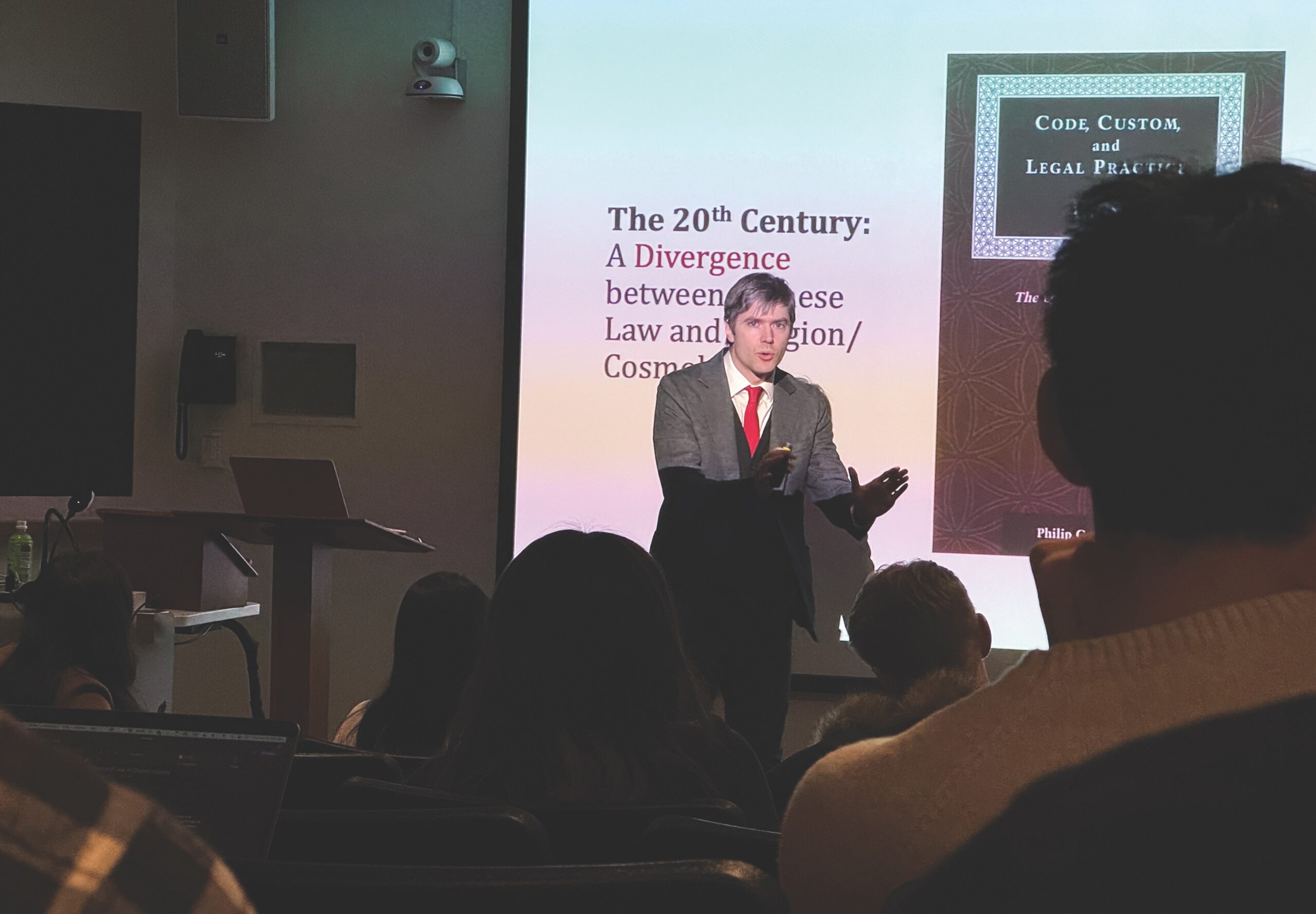Tristan Brown talks fengshui from the Qing Dynasty to today
February 16, 2024
 Courtesy of Joy Wang
Courtesy of Joy WangLast night, the Asian Studies Program hosted Tristan Brown, professor of history at the Massachusetts Institute of Technology, to present on his new book, “Laws of the Land: Fengshui and the State in Qing Dynasty China.”
Brown is a historian of science, law and religion in early modern China. Both his book and his talk focus on fengshui—the harmony of structures in line with the “vital essence,” or qi, of buildings, cities and other physical structures—and its intersection with China’s Qing dynasty era legal claims regarding fengshui in the 19th century.
Brown’s talk primarily focused on the legal cases started in response to the growth of fengshui. He recalled how he searched through 500 legal documents from Sichuan, Beijing and Taiwan, matched the complaints to fengshui maps and connected the legal issues with fengshui manuals. Through this process, Brown found that complaints of endangering fengshui had legitimate and important legal consequences.
“My argument is the Qing state consciously accorded a space in legal practice for the consideration of fengshui claims. That space needed to be there. Fengshui had to be considered for the legal system to work,” Brown said.
He also challenged the Western view on fengshui—both during the time of the Qing dynasty and today. According to Brown, during the 19th century, Westerners saw fengshui as a superstition, but still understood the value of the practice to Qing society.
“The 19th-century Western observers of fengshui noticed that fengshui was here and was important. They thought it was irrational. They didn’t think it made sense. They didn’t take it very seriously. But they thought it was important, and they saw it as related to law and politics,” Brown said.
However, Brown observed that the perception of fengshui as a serious component of Chinese society has waned in the Western perspective as time has passed and has since been incorporated into modern Chinese society.
“If you don’t call it fengshui, you’re fine,” Brown said. “If it’s called ‘geography’ or ‘city planning’ or ‘architecture,’ you’re fine, but if you say ‘fengshui,’ it’s suddenly like, ‘Oh, what are you talking about? That’s a superstition.’ But the point is that the boundaries between these things are not fixed. They’re very fluid.”
In addition to delegitimizing fengshui, Brown remarked that modern-day Western stereotypes of fengshui distance the practice from the political landscape from which it first formed.
Assistant Professor of History and Asian Studies Sakura Christmas, who helped bring Brown to campus, hoped that the talk would deepen students’ understanding of fengshui beyond today’s Western perceptions.
“These days, [fengshui is] kind of this trendy interior design…. But it deeply structured East Asian powers—not just China, but also Japan and Korea as well,” Christmas said. “For students to get a better understanding of how people viewed the world differently in the past and the richness of our human experience is what I would want them to get out of [the talk].”
Many students at the talk were part of Christmas’s East Asian Environmental History class, where they have read chapters from Brown’s book and discussed related topics.
Professor of Religion and Middle Eastern and North African Studies Robert Morrison was also in attendance and noted the relevance of Brown’s talk to his own research.
“I thought [the talk] was a dynamic, fast-paced, informative talk about the intersection of law knowledge systems and the environment,” Morrison said. “I was originally invited by [Christmas], but I also teach religion, nature and the environment, and fengshui does come up in an adjacent fashion when we study South Asia.”
Brown also raised non-legal applications of fengshui in the Qing dynasty. Brown posited fengshui as a type of medicine for Chinese society, improving the well-being of everything from city infrastructure to the health of individuals.
“When a fengshui master, a specialist in fengshui, puts this knowledge into practice, fengshui becomes something like the medicine of the land,” Brown said.
Beyond applications of fengshui, Christmas noted the importance of Brown’s lecture itself regarding Asian and Asian-American communities on campus, including tonight’s event with Ocean Vuong, to foster a more inclusive Bowdoin experience.
“While [the timing] wasn’t intentional, I do think that this sort of programming both reflects the changing body of the student campus, but it also energizes it,” Christmas stated. “It kind of reminds us that there’s this larger world out there in terms of what’s going on, and that’s really sort of what I hope people would take from it.”

Comments
Before submitting a comment, please review our comment policy. Some key points from the policy: